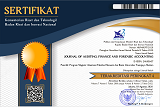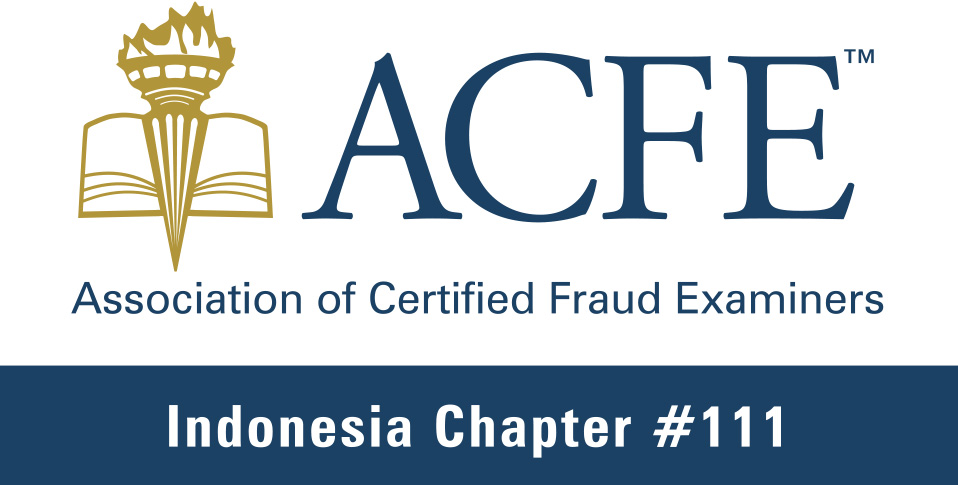Do Internal Control and Compensation Matters in Fraud at Local Government? Information Foraging Perspective
Abstract
Keywords
Full Text:
PDFReferences
Alfawareh, F. S., Che Johari, E. E., & Ooi, C. -A. (2023). Governance Mechanisms, Firm Performance and CEO Compensation: Evidence from Jordan. Journal of Financial Reporting and Accounting. https://doi.org/10.1108/JFRA-01-2023-0062
Ali, A. B., & Chouaibi, J. (2023). Mediating Effect of ESG Performance on Executive Incentive Compensation-Financial Performance Relationship: Evidence from MENA Banking Sector. Corporate Governance. https://doi.org/10.1108/CG-02-2023-0065
Amisepti, A. (2019). Peran SKPD Dalam Menghasilkan Laporan Keuangan Daerah Yang Kredibel Dan Akuntabel. https://bpkd.lhokseumawekota.go.id/.
Amril, A. A., Mahaputra, U., Yamin, M., Defitri, S. Y., Mahaputra, U., Yamin, M., Das, N. A., Mahaputra, U., & Yamin, M. (2022). Pengaruh Asimetri Informasi dan Kesesuaian Kompensasi serta Ketaatan Aturan Akuntansi Terhadap Kecurangan Akuntansi (Studi Empiris pada OPD Kabupaten Tanah Datar). OPTIMAL: Jurnal Ekonomi dan Manajemen, 2(3), 239-260.
Association of Certified Fraud Examiners. 2019. Report to the Nation on Occupational Fraud and Abuse. Accessed at http://www.acfe.com.
Badewin. B. (2021). Efektivitas Pengendalian Internal, Asimetri Informasi Dan Implementasi GGG Terhadap Kecenderungan Kecurangan Akuntansi Pada Organisasi Perangkat Daerah Kab. Indragiri Hilir. Jurnal Akuntansi dan Keuangan 10(1), 45–55. https://doi.org/10.32520/jak.v10i1.1651
Bhatia, A., & Kaur, A. (2023). The Influence of Information Asymmetry on the Interaction between Voluntary Corporate Disclosure and Cost of Equity: Evidence from Publicly Traded Indian Enterprises. International Journal of Law and Management. https://doi.org/10.1108/IJLMA-05-2023-0120
Cheliatsidou, A., Sariannidis, N., Garefalakis, A., Azibi, J., & Kagias, P. (2023). The International Fraud Triangle. Journal of Money Laundering Control, 26(1), 106-132. https://doi.org/10.1108/JMLC-09-2021-0103
Cressey, D. R. (1953). Other People's Money; A Study in the Social Psychology of Embezzlement. Glencoe, IL, Free Press.
Dashtbayaz, M. L., Salehi, M., & Hedayatzadeh, M. (2022). Comparative Analysis of the Relationship between Internal Control Weakness and Different Types of Auditor Opinions in Fraudulent and Non-Fraudulent Firms. Journal of Financial Crime, 29(1), 325-341. https://doi.org/10.1108/JFC-01-2021-0005
Gibson, J. L., Ivancevich, J. M., & Donnely, J. H. (2012). Organisasi: Perilaku, Struktur, Proses. (Terjemahan) Edisi Delapan. Jakarta: Binarupa Aksara.
Hamrouni, A., Bouattour, M., Toumi, N. B. F., & Boussaada, R. (2022). Corporate Social Responsibility Disclosure and Information Asymmetry: Does Boardroom Attributes Matter? Journal of Applied Accounting Research, 23(5), 897-920. https://doi.org/10.1108/JAAR-03-2021-0056
Hatane, S. E., Supangat, S., Tarigan, J., & Jie, F. (2019). Does Internal Corporate Governance Mechanism Control Firm Risk? Evidence from Indonesia’s Three High-Risk Sectors. Corporate Governance, 19(6), 1362-1376. https://doi.org/10.1108/CG-02-2019-0071
Hidayat, I. (2018). Standar Pelayanan Publik Pondasi Kepuasan Masyarakat. Ombudsman. https://ombudsman.go.id/pengumuman/r/artikel--standar-pelayanan-publik-pondasi-kepuasan-masyarakat
Homer, E. M. (2020). Testing the Fraud Triangle: A Systematic Review. Journal of Financial Crime, 27(1), 172-187. https://doi.org/10.1108/JFC-12-2018-0136
Indah, L. N., Imtikhanah, S., Andayani, T. D., & Rachmani, F. A. (2021). Pengaruh Keefektifan Pengendalian Internal, Asimetri Informasi, Kesesuaian Kompensasi Dan Ketaatan Aturan Akuntansi Terhadap Kecenderungan Kecurangan Akuntansi (Studi Kasus pada OPD Kabupaten Kendal). Neraca, 17(2), 1–13. https://doi.org/10.48144/neraca.v17i2.628
Kalelkar, R., & Nwaeze, E. (2023). The Functional Background of the Compensation Committee Chair: The Choice and Weight of Performance Measures in CEO Compensation. Asian Review of Accounting. https://doi.org/10.1108/ARA-01-2023-0019
Komala, R., Piturungsih, E., & Firmansyah, M. (2019). Pengaruh Asimetri Informasi, Moralitas Individu dan Pengendalian Internal Terhadap Kecenderungan Kecurangan Akuntansi. E-Jurnal Akuntansi, 29(2), 645-657. https://doi.org/10.24843/EJA.2019.v29.i02.p12
Koomson, T. A. A., Owusu, G. M. Y., Bekoe, R. A., & Oquaye, M. (2020). Determinants of Asset Misappropriation at the Workplace: The Moderating Role of Perceived Strength of Internal Controls. Journal of Financial Crime, 27(4), 1191-1211. https://doi.org/10.1108/JFC-04-2020-0067
Kurniawan, P. C., & Izzaty K. N. (2019). Pengaruh Good Corporate Governance dan Pengendalian Internal Terhadap Pencegahan Fraud. EconBank: Journal Economics and Banking, 1(1), 55-60. https://doi.org/10.35829/econbank.v1i1.2
Lee, J., Koh, K. (R)., & Shim, E. D. (2023). Managerial Incentives for ESG in the Financial Services Industry: Direct and Indirect Association between ESG and Executive Compensation. Managerial Finance. https://doi.org/10.1108/MF-03-2023-0149
Marsuni, N. S., Rasulong, I., & Adziem, F. (2022). Factors Affecting the Implementation of Good Government Governance (GGG) and Its Implications for Performance Accountability. Balance Jurnal Ekonomi, 18(1), 29-36.
Mathis, R. L., & Jackson, J. H. (2006). Human Resource Management: Manajemen Sumber Daya Manusia. Salemba Empat.
Najahningrum, A. F. (2013). Faktor-Faktor yang Mempengaruhi Kecenderungan Kecurangan (Fraud): Persepsi Pegawai Dinas Provinsi DIY. Skripsi, Universitas Negeri Semarang, Semarang.
Nofianti, L., & Suseno, N. S. (2014). Factors Affecting Implementation of Good Government Governance (GGG) and Their Implications Towards Performance Accountability. Presented at International Conference on Accounting Studies 2014, ICAS 2014, 18-19 August 2014, Kuala Lumpur, Malaysia
Oliveira, G. M. d., Cunha, C. F. d., Caleman, S. M. D. Q., & Maia, R. L. G. (2019). Information Asymmetry: The Case of Cattle Supply Transaction in Brazil. British Food Journal, 121(8), 1825-1837. https://doi.org/10.1108/BFJ-01-2019-0041
Pasolong, H. (2007). Teori Administrasi Publik. Alfabeta.
Pratama, B. (2022). Impresi Pengendalian Internal, Persepsi Kesesuaian Kompensasi, Dan Ketaatan Pada Aturan Akuntansi Terhadap Kecenderungan Kecurangan Akuntansi. Jurnal Economina, 1(1), 35–48. https://doi.org/10.55681/economina.v1i1.16
Rizqia, L., & Widajantie, T. D. (2022). Pengaruh Efektivitas Sistem Pengendalian Internal, Keadilan Organisasi, Dan Implementasi Good Governance Terhadap Kecenderungan Kecurangan Akuntansi Pada OPD Kabupaten Jombang. Fair Value: Jurnal Ilmiah Akuntansi Dan Keuangan, 4(10), 4637–4647. https://doi.org/10.32670/fairvalue.v4i10.1775
Rivai, V. (2010). Manajemen Sumber Daya Manusia untuk Perusahaan dari Teori ke Praktik. PT. Raja Grafindo.
Russell, M. (2015). Continuous Disclosure and Information Asymmetry. Accounting Research Journal, 28(2), 195-224. https://doi.org/10.1108/ARJ-11-2013-0085
Salehi, M., & Ghasempour, F. (2021). Material Internal Control Weakness with Intangible Assets, Capital Structure and Commercial Risk. Management Research Review, 44(7), 1059-1082. https://doi.org/10.1108/MRR-06-2020-0335
Shin, H., & Park, S. (2020). The Internal Control Manager and Operational Efficiency: Evidence from Korea. Managerial Auditing Journal, 35(7), 979-1006. https://doi.org/10.1108/MAJ-04-2019-2253
Suardini, D., Mariana, D., Rahmatunnisa, M., & Sumadinata, W. S. (2018). Implementation of Good Government Governance through E-Government. International Journal of Engineering & Technology, 7(3.25), 478-481.
Sulaiman, S., Nizam, A., Kesuma, F. T. M., Madjid, I., & Siregar, R. (2018). The Role of Good Government Governance Principles in Enhancing the Performance of Public Organization in Aceh, Indonesia. Advances in Social Science, Education and Humanities Research, 292, 731-738.
Tessema, A. M., Garas, S., & Tee, K. (2017). The Impact of Islamic Accounting Standards on Information Asymmetry: The Case of Gulf Cooperation Council (GCC) Member Countries. International Journal of Islamic and Middle Eastern Finance and Management, 10(2), 170-185. https://doi.org/10.1108/IMEFM-09-2016-0129
Tickner, P., & Button, M. (2021). Deconstructing the Origins of Cressey’s Fraud Triangle. Journal of Financial Crime, 28(3), 722-731. https://doi.org/10.1108/JFC-10-2020-0204
Turnip, Y. (2019). Terkena Kasus Korupsi, 21 ASN Pemprov Bengkulu Dipecat. Geosiar.Com. https://www.google.com/amp/s/geosiar.com/2019/03/21/terkena-kasus-korupsi-21-asn-pemprov-bengkulu-dipecat/amp/
Wu, K., Sorensen, S., & Sun, L. (2019). Board Independence and Information Asymmetry: Family Firms vs Non-Family Firms. Asian Review of Accounting, 27(3), 329-349. https://doi.org/10.1108/ARA-05-2018-0110
Wulandari, D. N., & Nuryanto, M. (2018). Pengaruh Pengendalian Internal, Kesadaran Anti-Fraud, Integritas, Independensi, dan Profesionalisme Terhadap Pencegahan Kecurangan. Jurnal Riset Akuntansi Mercu Buana, 4(2), 117-125. https://doi.org/10.26486/jramb.v4i2.557
Yulia, F., Anugerah, R., & Azlina, N. (2021). Pengaruh Keefektifan Pengendalian Internal, Ketaatan Aturan Akuntansi, Kesesuaian Kompensasi, Moralitas Manajemen, dan Budaya Etis Organisasi Terhadap Kecenderungan Kecurangan Akuntansi. Jurnal Ilmiah FEASIBLE, 3(1), 88-96. 10.32493/fb.v3i1.2021.88-96.9549
DOI: https://doi.org/10.21107/jaffa.v11i2.22129
Refbacks
- There are currently no refbacks.
Our Journal indexed by:
Our support tools using:



This work is licensed under a Creative Commons Attribution 4.0 International License.












